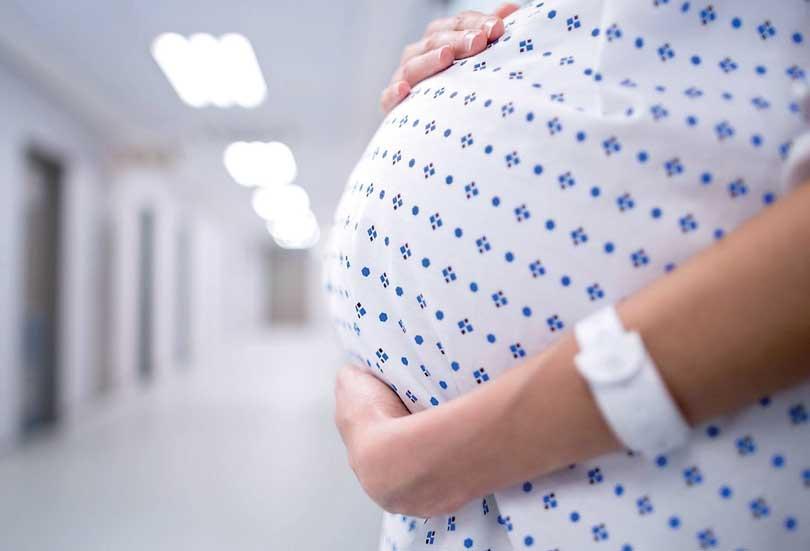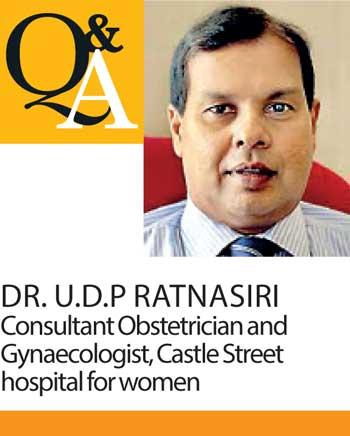Reply To:
Name - Reply Comment
Last Updated : 2024-04-19 19:28:00

 Hypertension in pregnancy is one of the commonest health complications encountered by expectant mothers. Awareness about hypertension in pregnancy is important because this condition has the potential to cause serious repercussions on both the mother and the baby. Following are a few excerpts of the interview conducted with Dr. U.D.P Ratnasiri, Consultant Obstetrician and Gynaecologist, Castle Street hospital for women regarding hypertension in pregnancy.
Hypertension in pregnancy is one of the commonest health complications encountered by expectant mothers. Awareness about hypertension in pregnancy is important because this condition has the potential to cause serious repercussions on both the mother and the baby. Following are a few excerpts of the interview conducted with Dr. U.D.P Ratnasiri, Consultant Obstetrician and Gynaecologist, Castle Street hospital for women regarding hypertension in pregnancy.
How do pregnant women get hypertension?
Hypertension in pregnancy is considered when the blood pressure reading of a pregnant mother is persistently 140/90 mmHg or above.
The reason for hypertension in pregnancy is not well understood. Even though there are a few hypotheses regarding the aetiology of this condition, the main cause is the improper development of the placenta.
 Who are at more risk of getting hypertension in pregnancy?
Who are at more risk of getting hypertension in pregnancy?
Women who are having chronic hypertension or diabetes, older women, women less than 20 years of age, those who have had hypertension in previous pregnancies and women having multiple pregnancies have a higher risk of developing pregnancy induced hypertension. These groups need careful surveillance for developing hypertension during their antenatal period, especially after 20 weeks of gestation.
How common is it?
Pregnancy induced hypertension is present in around 6 to 10 percent of pregnancies. This is more common amongst mothers undergoing the first pregnancy. All pregnant women are screened for hypertension during their antenatal period periodically. Some develop hypertension as early as twenty weeks of pregnancy and others develop the condition when the pregnancy is more advanced.
What are the dangers of pregnancy induced hypertension to the mother and the baby?
Hypertension is a leading cause of maternal and neonatal morbidity and mortality in the world. Pregnancy induced hypertension increases the risk to both mother and the fetus. All the systems in the mother’s body can be affected in this condition. Severity of the effects on the mother depends on the blood pressure as well as the duration of the condition.
Mothers with uncontrolled hypertension can go into fits known as eclampsia. Rupture of vessels in the brain, kidney and liver failure, problem of blood clotting, heart and respiratory failure are some other severe effects on the mother. These effects can be minimized with the control of the blood pressure and delivery of the baby.
There can be slowing of development of the fetus and rarely, placenta can get detached from the uterine wall with sudden vaginal bleeding. Fetus has a high risk of death inside the womb in these situations.
Mother may require intensive care treatment when the disease condition is very severe. In extreme situations where the mother’s body systems are severely affected, premature delivery of the baby may have to be carried out to save the mother’s life.
How should the condition be monitored?
Once a mother develops hypertension, careful clinical assessment along with blood and urine investigations and ultrasound assessment of the fetus should be carried out periodically to assess the condition of the mother and the fetus.
In addition to careful monitoring of serial blood pressure, blood investigations are done to assess the maternal organ involvement e.g. Kidney, liver, blood coagulation. Urine is tested for protein to assess the severity of the condition. Ultrasound examination of the fetus is done to assess its growth and wellbeing. In addition, electronic monitoring of fetal heart rate is done to assess the adequacy of the blood supply to fetus.
The clinician should decide whether the pregnancy can be prolonged or needs immediate delivery, depending on the severity of the condition and maternal organs and
fetal involvement.
What are the treatment options available?
Main goal of the treatment is to control the blood pressure with antihypertensive drugs and prevent the mother from developing fits. Some mothers may need prolonged stay in hospital when the hypertension is moderate or severe.
The delivery of the fetus and the placenta removes the cause for hypertension and is the definitive treatment. However, the decision for delivery has to be balanced with severity of the maternal disease and the maturity of the fetus. Some of the babies delivered early may need premature baby care in specialized units.
What are the signs that the expectant mothers should be alert about?
Pregnancy induced hypertension could be a silent disease when it is in milder form. But when it develops with significant filtering of protein in urine, it is known as preeclampsia. This condition can present with many symptoms and need extensive follow up.
If a pregnant woman is having one or more of the following signs, it is important to seek urgent medical care because it might be a sign of pre-eclampsia.
Is there a risk of getting hypertension again in subsequent pregnancies?
The risk for developing hypertension in subsequent pregnancies is high in a woman with a history of pregnancy induced hypertension. Hypertensive disorders have a 20--50% recurrence rate in the second pregnancy. Women who developed hypertension earlier in the pregnancy are having an even higher risk of getting hypertension in next pregnancy.
Is there a need for follow up of blood pressure after the baby is delivered?
Hypertension in pregnancy usually resolves after the delivery of the baby. It may take a few days in some mothers and in a very few paients, hypertension persists for a longer time. These mothers are referred to the physician for further control of hypertension. The drugs used during pregnancy for the control of hypertension ;except for the drug methyldopa, need to be continued with regular blood pressure monitoring in these patients.
Mothers who have developed hypertension in pregnancy also have a higher chance of developing chronic hypertension in the future. Therefore they need to monitor their blood pressure at least every six months and change their lifestyle to include healthier food and adequate exercises.

Add comment
Comments will be edited (grammar, spelling and slang) and authorized at the discretion of Daily Mirror online. The website also has the right not to publish selected comments.
Reply To:
Name - Reply Comment
On March 26, a couple arriving from Thailand was arrested with 88 live animal
According to villagers from Naula-Moragolla out of 105 families 80 can afford
Is the situation in Sri Lanka so grim that locals harbour hope that they coul
A recent post on social media revealed that three purple-faced langurs near t